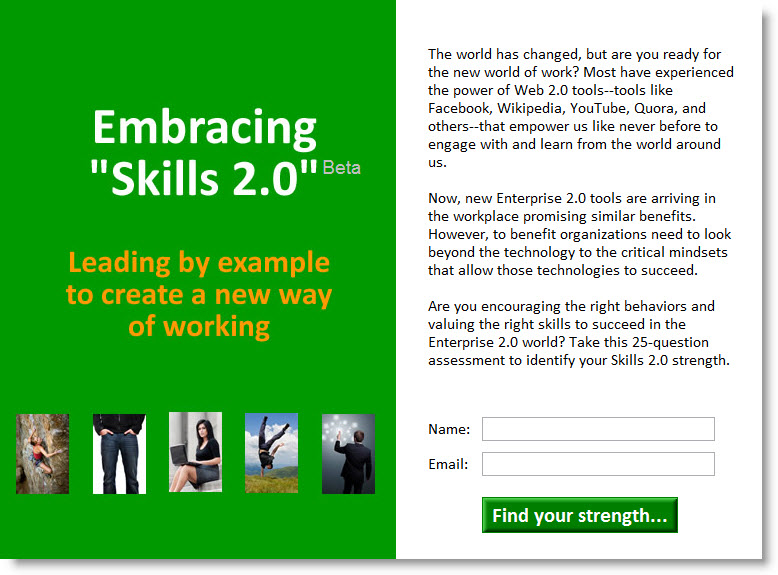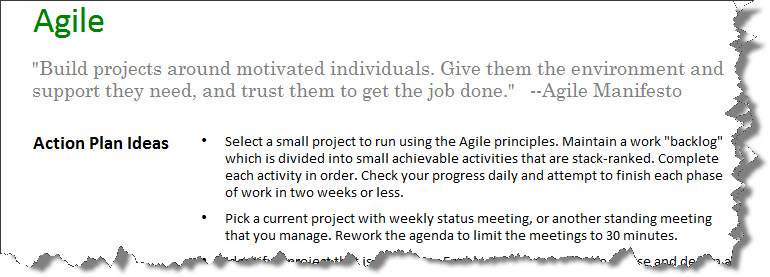Are you encouraging the right behaviors and valuing the right skills to succeed in an Enterprise 2.0 world?
Most have experienced the power of "Web 2.0" tools -- tools like Facebook, Wikipedia, YouTube, Quora and others -- that empower us like never before to engage with and learn from the world around us. Now, new "Enterprise 2.0" tools are arriving in the workplace promising similar benefits. However, to benefit, organizations need to look beyond the technology to the critical mindsets that allow those technologies to succeed.
The world has changed. By empowering people and tapping into the power of “we”, the web has changed the way we live and is increasingly changing the way we work. New business models are emerging that challenge the ways they have always worked -- models that force us to reconsider the skills required to succeed.
And, while most organizations recognize this, many may be hanging on to dated models for how they manage their people, beginning with the basic skills and behaviors that they request from and reward in their employees.
It is important that organizations take time out to evaluate the skills they value in their employees. Without this re-evaluation, organizations risk being locked into older, slower, business models that will hamper their ability to innovate and compete with organizations that have adopted Enterprise 2.0 technologies and a Skills 2.0 mindset.
To realize the real benefits of these new business models, organizations need to go beyond asking for change or implementing new technologies, they need to identify and reward skills & behaviors that are aligned with the organization of the future.
This solution proposes an examination of individual skills and behaviors that are critical for the success in a new world of work and uses existing employee strengths to drive organizational change. Core components of the solution include:
Prerequisites: Believe in the Benefit of these new Enterprise 2.0 Models
For this solution to be successful, organizations must:
- Acknowledge that, influenced by models of agility and innovation on the web, new business models are emerging that allow organizations to compete in new ways
- Determine that these business models can benefit the organization, or at a minimum believe that there is enough potential to experiment in this area
- Recognize that to truly embrace these new models, organizations may need to reconsider the day-to-day skills and behaviors they value and reward in their employees, as well as the ways in which they measure and evaluate theses skills and behaviors
- Believe that individuals and small teams can drive organizational change
Self-Evaluation: Focus on Strengths
Individual participants will use this tool to raise awareness of the skills needed to succeed in a Web 2.0 world and identify their top strengths:
- Each individual will complete an assessment that addresses five critical areas of The Skills 2.0 Model.
- The results of the assessment will identify a skill for each individual in which they already demonstrate some level of strength.
- Each individual will identify a short-term, measurable action or set of actions that further builds upon this existing skill and demonstrates value to the organization.
Team Evaluation: Focus on Organizational Benefit
Team collaboration is built into the solution in multiple areas:
- Participants will have the opportunity to help refine individual action plans to ensure they are targeted at organizational benefit as well as individual growth/development.
- At the mid-point of the action plan execution period, teams will regroup to discuss progress and help other participants make any needed adjustments in their action plans.
- At the conclusion of the action plan execution period, the team will evaluate and select individuals whose actions added the most value to the organization.
- The team will collectively document and publish the results of the experiment for the benefit of the rest of the organization.
The overall goal of this solution would be to move the organizational mindset to closer alignment with and support of skills and behaviors critical for success in the Enterprise 2.0 world. Desired outcomes of this evaluation include change on a small or large scale:
- INDIVIDUAL: Modification of personal behavior to be more aligned with new models for success
- TEAM: Increased awareness amongst co-workers, to help create a culture that is capable of identifying and encouraging new skills and behaviors (or that is at least not discouraging of desired skills and behaviors)
- ORGANIZATION: Openness to re-evaluate and modify existing measurement and reward systems to encourage skills and behaviors need to compete and succeed in an Enterprise 2.0. world
Hypotheses:
Success in the Enterprise 2.0 world relies on skills that have not been traditionally emphasized or valued in the workplace. By encouraging employees to actively model Skills 2.0 behaviors, we will gradually create a culture where these behaviors are standard practice.
Measurement:
The goal of this experiment is to raise awareness and create an environment where it is okay to think and work differently. Thus, even if people do not complete (or even create!) their action plans, the exercise is a success if conversations occur where people acknowledge that, to lead in an Enterprise 2.0 world, we need to revisit the skills and behaviors that we value within the organization.
In addition to the primary metric of increased dialog, we would propose the following specific metrics for success which we would rely on participants to provide:
Increased conversation
- Number of internal reports created documenting the results of the hack
- Number of external articles or public papers published documenting the results of the hack
Measurement Models Impacted
- Number of organizations that indicate that they are considering or have modified their official performance measurement systems in response to this or similar models
Indirect Organizational Impacts
- # of participants who complete the assessment
- # of people who develop an action plan
- # of people who complete their action plan
Target audiences:
- INDIVIDUALS and TEAMS who want to drive change within their organization
- MANAGERS who could individually reward new behaviors outside of traditional evaluation models
- LEADERS who are able to affect changes in existing evaluation models, such as HR Professionals responsible for current competency models or performance assessment systems
The exercise would involve a single volunteer group. The group could be formed in a variety of ways:
1) A manager proposes this to their own team;
2) A team member suggests this exercise to the team and/or manager;
3) A team or individual team member brings this model to the HR team for evaluation
Success:
1) Members of the volunteer group should complete the associated Skills 2.0 assessment to identify where they can be Skills 2.0 Leaders & Evangelists.
2) Team completes the sprint plan outlined below.
Recommended Reward:
Can be determined by the individual leading the effort and could be:
1) $50 gift card to the 3 participants who demonstrate the most impact, as voted by the team
2) Some sort of internal organizational recognition to the entire participating team
3) A published "team success" report that can be used for external recognition and awards
Timeline (10 weeks total):
- Sprint 1 (1 week): Each individual completes assessment on own.
- Sprint 2 (1 week): Each individual develops an action plan then shares with team to refine.
- Sprint 3 (3 weeks): Execute on action plan. Either weekly or at end of sprint, discuss progress & adjust personal action plans.
- Sprint 4 (3 weeks): Execute on action plan, Phase 2. Either weekly or at end of sprint, team meets to discuss progress. At end of sprint, the team meets and votes on the winner/s.
- Sprint 5 (2 weeks): Document & publish results.
The Skills 2.0 Model has three components:
- Skills 2.0 Model: Assessment Tool – A short-form assessment tool to quickly identify an individual’s possible strengths and put them on a course of action to increase the level of conversation within an organization. The self-assessment is not intended to be a comprehensive evaluation of all skills and behaviors required for Enterprise 2.0 success. Instead, it is intended to be a method for getting the conversation started quickly about which skills should be valued. The assessment will be refined over time based on participant feedback.
- Skills 2.0 Model: Skills & Behaviors – A set of recommended skills & behaviors that organizations may wish to consider rewarding. Our hope is that this hack and the short-form assessment drive interest to engage in a more thorough examination of the skills that the organization values, and the norms that they are willing to challenge. To that end, the model includes a more detailed version of the skills & behaviors underlying the assessment tool.
- Resources – Supporting tools and research that might be worth reviewing to evaluate and drive these new behaviors.
This project was developed as part of the Management 2.0 Hackathon, a hands-on, collaborative effort focused on generating fresh and practical answers to today's management challenges. The Hackathon is an experiment in large-scale problem solving from the Management Innovation eXchange (MIX) in collaboration with Saba and the Enterprise 2.0 Conference.
This hack was conceived by Ben Willis (@BenWillisSF) and was built by Ben, Nyla Reed (@nylareed), and more than 800 other progressive management practitioners and technologists from around the world.
Please help us improve by providing input on the assessment, action plan, or any other aspect of the Skills 2.0 model.
We are especially interested in hearing about your experiences with putting any action plans from this experiment into practice.





You need to register in order to submit a comment.